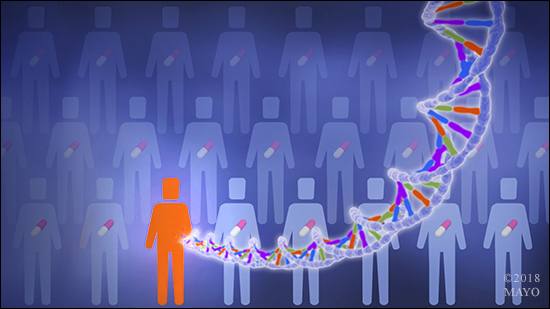-
Featured News
Mayo Clinic Q and A: Pharmacogenomics — individualizing medication to improve care
 DEAR MAYO CLINIC: How much is known about the role genetics play in how an individual reacts to medications?
DEAR MAYO CLINIC: How much is known about the role genetics play in how an individual reacts to medications?
ANSWER: Genetics can significantly affect how a person’s body responds to medications. This topic is an active area of study called pharmacogenomics. Many researchers are investigating how pharmacogenomics can enhance medical treatment and tailor medications to best fit a person’s needs, while minimizing the risk of side effects.
Traditionally, medications have been prescribed based on the assumption that a drug will work approximately the same way in each person, with some factors such as age, weight, sex and medical conditions considered. But recent research has clearly shown that’s not always true. And adjusting doses over time based on response to a medication is slow and challenging.
In response, pharmacogenomics — the study of how drugs work coupled with information known about human genes — is being used to tailor medications and their doses for people based on their genetic makeup. This is an important field, because some medications simply do not work the same way in everyone. And genetics may be part of the reason why.
For example, for the pain medication codeine to work properly, the body must be able to convert it into morphine, so it can become active and ease pain. About 15 to 20 percent of the population is unable to metabolize the medication from codeine into morphine due to genetics. That means the medication cannot do what it’s intended to, and those people don’t receive the pain relief they need — even if they take the medication exactly as prescribed.
Other drugs that researchers have identified as being influenced by genetics include some medications used to treat cancer, heart disease, lung disease, HIV infection, arthritis, high cholesterol and depression, among many others. Currently, almost 200 medications have label information regarding pharmacogenomic biomarkers. Pharmacists and prescribers can use pharmacogenomics to pick the right medications and adjust dosing based on genetics.
In addition to affecting how well a medication does or does not work, genetics also can affect the side effects people experience when they take a certain type of drug. In some cases, a standard dose of a medication that’s usually associated with little or no side effects could trigger a more significant response in someone whose genetic makeup predisposes them to react to that medication. When it comes to strong pain killers called opioids, researchers are working to determine how genetics may play a role in addiction to these powerful drugs.
Researchers exploring pharmacogenomics are investigating how best to identify the genetic variations that affect the way medications work. Perhaps just as importantly, they are also looking to identify ways that information can be conveyed in a timely manner to health care providers who prescribe the medications and pharmacists who dispense them, so they can make appropriate choices about which medications to use, based on a person’s genetics.
Research in pharmacogenomics is ongoing and remains in its early stages. Eventually, though, pharmacogenomics may be routinely used to help health care providers give patients customized medication in doses tailored to fit their genetic makeup that will translate into specific, individualized and effective care for each person. — Dr. Timothy Curry, Center for Individualized Medicine, Mayo Clinic, Rochester, Minnesota
Related Articles







